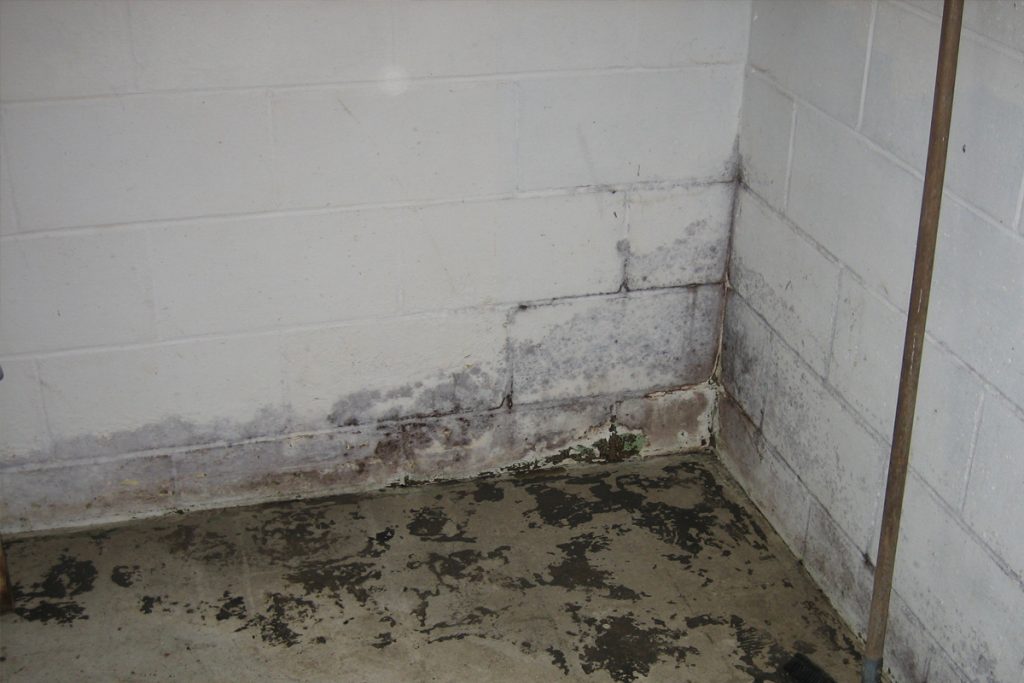It is common to find cracks in poured concrete and concrete block / cinderblock foundations, as well as in the mortar joints in brickwork and concrete block structures. In some instances concrete crack repairs are required for the remediation of cracks in concrete for structural reasons.
Are you wondering if a crack in your foundation that doesn’t leak water has to be fixed? Normally, basement crack repairs are undertaken to address homeowner concerns about the presence of cracks in their foundation and/or foundation cracks which are responsible for basement leaks. In this post we discuss fixing basement cracks which are not leaking.
The Repair of Non-leaking Cracks in Foundation Walls
Over the years we have concluded that a 2400 ft² home with a poured concrete foundation will have 7 – 10 visible cracks throughout the basement. Among these cracks, only a few typically leak or show signs of leaking or having leaked at some point in time.
When a basement crack is not leaking and appears to never have leaked, crack repairs are usually undertaken for one or more of the following reasons:
- There is concern that the presence of a crack in the foundation constitutes evidence that there is a problem with the structural integrity of the home;
- When there is a horizontal foundation crack;
- Because basement cracks, while not leaking at present, may leak at some point in the future; and
- When basement cracks are noted during home inspections conducted as part of the home sale process.
The method of repair of cracks in basement walls varies with the foundation type as well as the crack characteristics. For more information follow this hyperlink on basement waterproofing methods.
Cracks in Poured Concrete Basement Walls
Cracks in poured concrete foundation walls are the easiest to repair because they can be eliminated by an inexpensive injection of either epoxy or polyurethane resins into the cracks, consequently they are filled completely. Follow these hyperlinks for more information on basement crack repair by epoxy and polyurethane crack injection.
Note: Horizontal cracks in poured concrete foundations are very rare.
Cracks in Concrete Block / Cinderblock Basement Walls
There are always basement cracks in concrete block / cinder block foundations, and the extent of the cracking increases with the age of the foundation. Cracks in concrete block foundations primarily occur within the mortar joints binding the concrete blocks together; when foundation settlement has occurred cracks will occasionally develop in the concrete blocks themselves.
Regrettably, cracks in concrete block / cinder block foundation walls cannot be injected as are poured concrete walls; this is due to the fact that concrete blocks are hollow.
As injection crack repair techniques cannot be used for concrete block foundations, the repair of cracks in concrete block / cinderblock basement walls is rendered more complicated because the cracks cannot be repaired on the exterior without excavating the foundation. Crack repairs for the mortar joints of fully exposed foundation walls (both inside and out) are accomplished by tuck pointing (also referred to as re-pointing). Repairing cracks in concrete blocks cannot truly be repaired; the only possible, and temporary, repair is the application of a parge coat over the crack.
Concrete Block Basement Crack Patterns
There are a couple of basement crack patterns, exclusive to concrete block foundations, that are more significant than simple minor cracking in mortar joints. The crack patterns which are potentially symptomatic of structural problems are:
- Horizontal cracking of the mortar joints (usually at grade); and
- Step cracking in the mortar joints.
Horizontal cracking in a mortar joint at grade is proof that the soil outside is pushing the foundation wall inwards, thus the bottom of the foundation is tipping inwards. In extreme cases wall straightening is required, and this is an expensive procedure. When horizontal basement cracks are less than 2mm in width, reinforcement of the block wall will stabilize the crack and arrest further inward movement of the foundation wall.
Step cracking of concrete block foundation walls occurs due to settlement of the footing supporting the walls. The footing settlement occurs due to settlement of the soil beneath the footing, which is usually attributable to poor compaction of disturbed soil onto which the footing was poured, or to erosion of the soil beneath the footing, typically due to downspouts discharging water into the adjacent weeping tile.
While tuck pointing will fill the gaps in the mortar joints caused by step cracking, this type of basement crack repair actually does nothing more than conceal the gap in the mortar joint.
